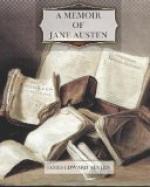But though such golden opinions were now and then gathered in, yet the wide field of public taste yielded no adequate return either in praise or profit. Her reward was not to be the quick return of the cornfield, but the slow growth of the tree which is to endure to another generation. Her first attempts at publication were very discouraging. In November, 1797, her father wrote the following letter to Mr. Cadell:—
’Sir,—I have in my possession a manuscript novel, comprising 3 vols., about the length of Miss Burney’s “Evelina.” As I am well aware of what consequence it is that a work of this sort shd make its first appearance under a respectable name, I apply to you. I shall be much obliged therefore if you will inform me whether you choose to be concerned in it, what will be the expense of publishing it at the author’s risk, and what you will venture to advance for the property of it, if on perusal it is approved of. Should you give any encouragement, I will send you the work.
’I am, Sir, your humble Servant, ‘GEORGE AUSTEN.’ ’Steventon, near Overton, Hants, ‘1st Nov. 1797.’
This proposal was declined by return of post! The work thus summarily rejected must have been ‘Pride and Prejudice.’
The fate of ‘Northanger Abbey’ was still more humiliating. It was sold, in 1803, to a publisher in Bath, for ten pounds, but it found so little favour in his eyes, that he chose to abide by his first loss rather than risk farther expense by publishing such a work. It seems to have lain for many years unnoticed in his drawers; somewhat as the first chapters of ‘Waverley’ lurked forgotten amongst the old fishing-tackle in Scott’s cabinet. Tilneys, Thorpes, and Morlands consigned apparently to eternal oblivion! But when four novels of steadily increasing success had given the writer some confidence in herself, she wished to recover the copyright of this early work. One of her brothers undertook the negotiation. He found the purchaser very willing to receive back his money, and to resign all claim to the copyright. When the bargain was concluded and the money paid, but not till then, the negotiator had the satisfaction of informing him that the work which had been so lightly esteemed was by the author of ‘Pride and Prejudice.’ I do not think that she was herself much mortified by the want of early success. She wrote for her own amusement. Money, though acceptable, was not necessary for the moderate expenses of her quiet home. Above all, she was blessed with a cheerful contented disposition, and an humble mind; and so lowly did she esteem her own claims, that when she received 150_l_. from the sale of ‘Sense and Sensibility,’ she considered it a prodigious recompense for that which had cost her nothing. It cannot be supposed, however, that she was altogether insensible to the superiority of her own workmanship over that of some contemporaries who were then enjoying a brief popularity. Indeed a few touches in the following extracts from two of her letters show that she was as quicksighted to absurdities in composition as to those in living persons.




